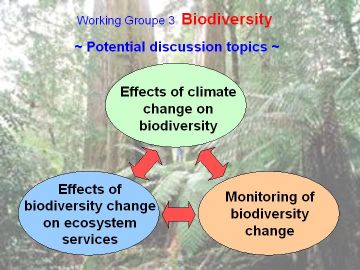

This WG will discuss on the possible research and development topics on biodiversity that could be collaborated between US and Japanese scientists. We propose the following three topics.
(i) The effect of global change on biodiversity
The effect of global change on biodiversity may appear in various aspects, though we have not fully developed the technique to detect and study it. We expect some leading scientists in this aspect to discuss the possible collaboration and future direction.
(ii) Biodiversity change and ecosystem services
The changes in biodiversity cause the deterioration in ecosystem services. We should know and evaluate more on what aspects of ecosystem services are likely to be lost in the case of biodiversity loss.
(iii) Monitoring biodiversity change To enable more timely and helpful monitoring of biodiversity change, we should develop methods and network for the monitoring. In actual, since the GEOSS is going to start in years, and the standardized methods and effective network should be developed
On the last day of the symposium, we are expected to have 15 min presentation and summary document (ca, 400-600 words) to:
(1) Review recent progress in studies on the relationship between global change and biodiversity.
(2) Identify knowledge gaps and obstacles to progress
(3) Identify opportunities for new collaborative research that address these problems
(4) Identify potential mechanism, frameworks and source of support for U.S.-Japan collaboration
(5) Identify concrete steps to be taken on by both U.S. and Japan sides to realize these opportunities
(1) and (2) will be well covered through our discussion on (i)-(iii), while (3)-(5) are for proposing an action plan for US-Japan collaborative project.
(I) Invitees except cochairs and keynote speakert are asked to have short presentation that summarizes what we know and key knowledge gaps relating to global change and biodiversity. This will take advantage of the expertise of each participant, which is unique. Also it will simplify the process of developing priorities for future research by covering existing knowledge and gaps thoroughly at the outset.
(II) Then 2-hour discussion on the (i)-(iii) topics, relevant to (1) and (2) requirements.
(III) Another 2-hour discussion on the possible action plan of joint biodiversity project, relevant to (3)-(5) requirements.
(IV) Finally some one hour is for the working group synthesis. Documentation will be a key issue, and we can do simultaneously with discussion, using a projector. We have time limit for discussion, so that some rough draft may be prepared beforehand for obtaining fruitful results.
Takashi KOHYAMA (Hokkaido Univ):
[external link]
Forest dynamics, TEMA (Global Change Impacts on Terrestrial Ecosystems in Monsoon Asia, a core research of IGBP-GCTE)
Japan side cochair
Tohru NAKASIZUKA (Research Institute for Humanity and Nature):
Forest dynamics / Biodiversity
Keynote speaker
Hiroyuki MATSUDA (Yokohama National Univ.):
[external link]
Theoretical biology / Risk management for fishery
Kanehiro KITAYAMA (Kyoto Univ.):
[external link]
Tropical rain forest / Biodiversity
Michio FUKUSHIMA (National Institute for Environmental Studies):
Aquatic ecosystem / Landscape ecology
Syoko SAKAI (Kyoto Univ.):
Tropical rain forest / Biodiversity
Tetsukazu YAHARA (Kyushu Univ.):
[external link]
Evolution and ecology / Conservation biology / Red data book of Japanese plants
Naoki KACHI (Tokyo Metropolitan Univ.)
Shuniti MAKINO (Forestry and Forest Products Research Institute)
Kimiko OKABE (Forestry and Forest Products Research Institute)
Toshinori OKUDA (National Institute for Environmental Studies)
Sandy J. ANDELMAN (Conservation International)
US side cochair
Kurt D. FAUSCH (Colorado State Univ.)
[external link]
US side rapporteur
John A. SILANDER, Jr. (University of Connecticut)
[external link]
Plant ecology and evolution / Biogeography and spatial processes in ecology / Landscape ecology / Conservation biology / Biology of Invasive species / Experimental plant population and community ecology / Population dynamics and competition / Forest community ecology of temperate and tropical regions.
Nancy KNOWLTON (Center for Marine Biodiversity & Conservation)
[external link]
Marine biodiversity / Ecology, evolution, behavior, and systematics of coral reef organisms / Speciation
Peter HUDSON (Pennsylvania State Univ)
Population dynamics of infectious diseases in wildlife, particularly those of concern humans and conservation
Peter KAREIVA (Santa Clara University) [external link]
Axel G ROSSBERG (Yokohama National Univ.)
Tomoya NAGAI (Japan Science and Technology agency)
Junichiro SUZUKI (Tokyo Metropolitan Univ.)
Masashi MURAKAMI (Hokkaido Univ.)
Takashi YAMANAKA (Ministry of Agriculture and Fisheries of Japan)
Takashi NISHIMURA (FRCGC/JAMSTEC)[external link]
Hisashi SATO (FRCGC/JAMSTEC)
[external link]

Any questions and suggestions on WG3 should be addressed to the convenor.